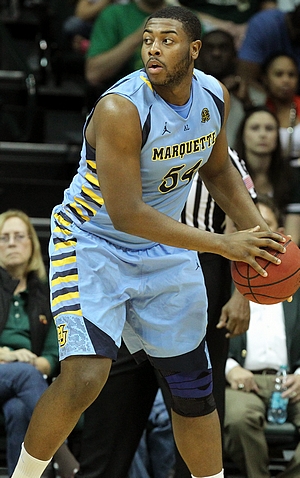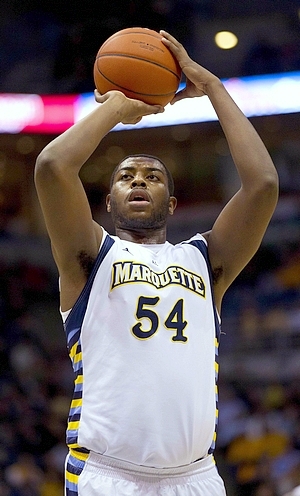
Josh Riddell
Davante Gardner was expected to take on a larger role in the Marquette offense last season after the graduation of Jae Crowder and Darius Johnson-Odom. His production level plateaued from his sophomore to junior season, though, as any substantial improvement in his skills was hindered by an inability to stay on the floor-- as he was only able to average 21.5 minutes per game. Gardner posted 11.5 points per game on 58.5% shooting with 4.8 rebounds per game, but his production per 40 pace adjusted of 21.9 points and 9.2 rebounds shows his potential if only he could find a way to stay on the court for longer stretches.
Gardner's inability to stay on the floor is not related to foul trouble, as he committed only two fouls per game last season. Instead, it has to do with his stamina, which, at 290 pounds, he has struggled with for his entire collegiate career. Gardner likely won't be asked to play more than 20 minutes on any NBA team he lands on, but if he cannot play more than this amount in college, scouts will have doubts that he can contribute while playing at the much faster pace of a NBA game.
Offensively, Gardner rarely looked for his shots outside the paint, as 91.8% of his offense is categorized as coming around the basket or on post-ups by Synergy Sports Technology. Around the basket, he averaged 1.37 points per possession, which ranked in the 92% percentile by Synergy Sports. He's a nimble player in the post, demonstrating nice footwork to get around the defenders, where he averaged 1.156 points per possession, which ranked in the 91% percentile by Synergy Sports. He is very effective in the paint against collegiate players, but his 6'8 size combined with his below the rim style of play suggests that he will likely struggle finding the same success against NBA big men.
One area where Gardner will have to show value to scouts is rebounding, particularly on the offensive end. His 3.9 offensive rebounds per 40 pace adjusted are merely average for a player of his size and actually represent a decrease from 5.2 his sophomore campaign. Since he doesn't have the physical attributes to just up go up and get the rebound, he has to rely on reading the ball coming off the rim and positioning to grab the loose ball. However, this means his effectiveness can be mitigated on this end by more athletic players, who can outjump him even if Gardner gets position.
On the defensive glass, he is not much better, as he grabbed only 5.2 defensive rebounds per 40 pace adjusted, one of the lower rates among NCAA center prospects. This will be a key skill for him going forward, so he will need to show a greater willingness and ability to rebound on the defensive end his senior season.
Defensively, there are significant questions about Gardner's potential at the NBA level. He will likely have to guard post players in the NBA and he will be at a major disadvantage due to his size. Although he has a nice wingspan to complement his frame, it might not be enough to bother most NBA centers, and he almost certainly won't be much of a paint protector, as he struggles to get off the ground. Outside of the post, he has surprising agility for a player his size, but will likely still struggle to stay in front of perimeter oriented big men, as he doesn't move well laterally to cover dribble penetration. When he closes out on shooters, he is often a step late on challenging shots. Even if he is able to recover and challenge the shot, bigger players are able to easily shoot over him without being bothered.
Looking forward, Gardner faces an uphill road if he wants to find his way onto an NBA roster next season. His first priority has to be improving his conditioning and demonstrating he is able to play more minutes at the pace of a collegiate game. There are plenty of holes in his game, so he will need to demonstrate value to scouts and show how he can compensate for his smaller size while filling a specific need for a NBA team.



























Comments